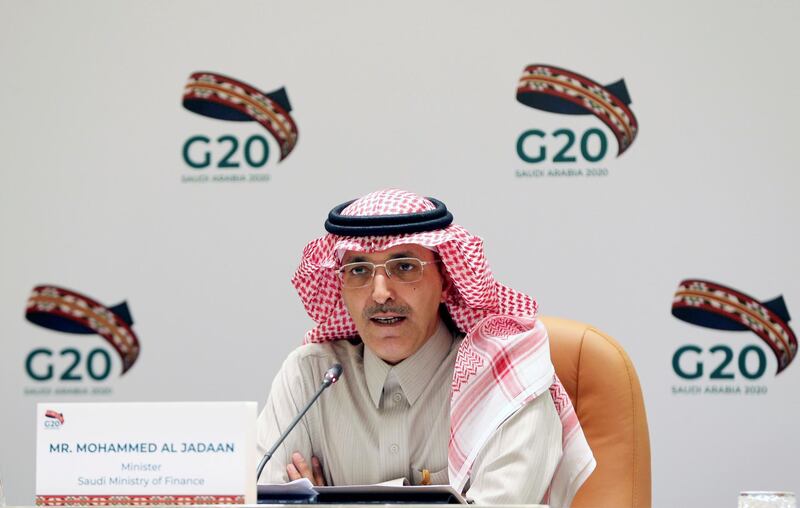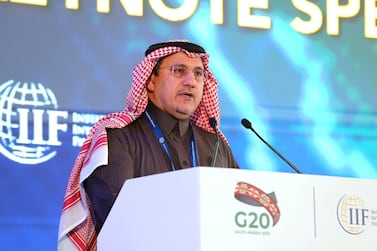Saudi Arabia could raise more than 50 billion riyals (Dh48.96bn) from the sale of stakes in state-controlled entities over the next five years, its finance minister said.
The kingdom, the Arab world's biggest economy, is now looking to sell assets in sectors that were previously not targeted for privatisation such as healthcare and education as it looks to diversify its revenue base and bring more efficiency to state entities, Mohammed Al Jadaan said on Wednesday during a Bloomberg webinar.
"While amounts are quite healthy and significant, I would imagine in the next four to five years it would be north of 50 billion [riyals] only in the sale of assets,” he said. “The amount is not what is driving this [though].”
Saudi Arabia’s efforts to build water, power and sewage sector projects with private consortiums has been a “successful journey”, he said. It is earmarking more assets in the water sector for privatisation and plans to bring some of its “mature assets in [the] form of companies” to the capital market, he said.
“There are few of them that are in the pipeline for 2020-21. I can’t disclose them because some of them have filed with the regulator and a few of them are at an advance stage,” Mr Jadaan said.
Privatisation is a key plank of Saudi Arabia’s Vision 2030 economic diversification agenda. The kingdom raised close to $30bn (Dh110.1bn) from the sale of shares in Saudi Aramco, the world’s largest oil producing company. The listing last year on the Tadawul stock exchange was the biggest initial public offering in the world. Earlier this year, the kingdom sold a stake in two grain mills and two more assets are being offered to private investors in the same sector.
The kingdom, the world’s biggest oil exporter, like other Middle Eastern producers is facing a double whammy of lower revenue from sale of hydrocarbons and the pandemic-driven slowdown. The country has increased its rate of Value Added Tax to 15 per cent, from the previous 5 per cent, to offset the impact of lower crude prices and boost its revenue base.
Asked if the kingdom will consider levying income tax as a more effective way of boosting revenue, Mr Al Jadaan said all options are under consideration. However, imposing income tax would require "a lot of preparation" and is unlikely to be introduced in the immediate future.
The tripling of VAT, the minister said, does not mean the kingdom is in austerity mode or would be entering into a new phase of belt-tightening. The kingdom has not reduced expenditure and has continued to spend on the main programmes that are part of Vision 2030, with “slight adjustments”.
Saudi Arabia is closely monitoring all sectors of the economy and is ready to roll out more stimulus measures if required. The kingdom has so far launched 200 fiscal and monetary initiatives worth $65bn, targeting sectors including financial services and small and medium-sized enterprises.
He said July frequency data is encouraging, indicating economic recovery in the kingdom, although there are still many uncertainties. The International Monetary Fund expects Saudi Arabia’s economy to contract 6.8 per cent this year. However, Mr Al Jadaan said the kingdom does not agree with the fund's projection.
“We stand ready to support whatever support is needed,” for economic recovery, he said when asked if the kingdom could roll out more stimulus.
The kingdom's sovereign wealth fund, the Public Investment Fund (PIF), will also continue to invest at home and abroad as it looks to capitalise on some of the opportunities available in the market.
“We have no specific geographic preference,” Mr Al Jadaan, who is also on the board of PIF, said. “We have invested heavily in tech and we will continue to look at these investments.”
PIF, he added, would look at the option of secondary offerings of shares in its local asset portfolio to "recycle mature investments".
"That's not driven by need of liquidity, though – they have ample liquidity," he said.
The kingdom, which has raised about $12bn international debt capital markets this year, is likely to approach the market at least once more in 2020, but has yet to decide the timing and currency of issuance.
Riyadh has raised funds from local debt markets and has issued “significantly more than what we had planned at the beginning of the year”, he said.








